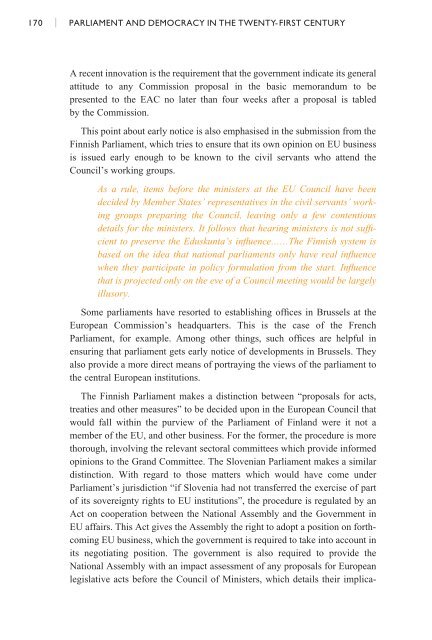PARLIAMENT AND DEMOCRACY - Inter-Parliamentary Union
PARLIAMENT AND DEMOCRACY - Inter-Parliamentary Union
PARLIAMENT AND DEMOCRACY - Inter-Parliamentary Union
Create successful ePaper yourself
Turn your PDF publications into a flip-book with our unique Google optimized e-Paper software.
170 I <strong>PARLIAMENT</strong> <strong>AND</strong> <strong>DEMOCRACY</strong> IN THE TWENTY-FIRST CENTURY<br />
A recent innovation is the requirement that the government indicate its general<br />
attitude to any Commission proposal in the basic memorandum to be<br />
presented to the EAC no later than four weeks after a proposal is tabled<br />
by the Commission.<br />
This point about early notice is also emphasised in the submission from the<br />
Finnish Parliament, which tries to ensure that its own opinion on EU business<br />
is issued early enough to be known to the civil servants who attend the<br />
Council’s working groups.<br />
As a rule, items before the ministers at the EU Council have been<br />
decided by Member States’ representatives in the civil servants’ working<br />
groups preparing the Council, leaving only a few contentious<br />
details for the ministers. It follows that hearing ministers is not sufficient<br />
to preserve the Eduskunta’s influence……The Finnish system is<br />
based on the idea that national parliaments only have real influence<br />
when they participate in policy formulation from the start. Influence<br />
that is projected only on the eve of a Council meeting would be largely<br />
illusory.<br />
Some parliaments have resorted to establishing offices in Brussels at the<br />
European Commission’s headquarters. This is the case of the French<br />
Parliament, for example. Among other things, such offices are helpful in<br />
ensuring that parliament gets early notice of developments in Brussels. They<br />
also provide a more direct means of portraying the views of the parliament to<br />
the central European institutions.<br />
The Finnish Parliament makes a distinction between “proposals for acts,<br />
treaties and other measures” to be decided upon in the European Council that<br />
would fall within the purview of the Parliament of Finland were it not a<br />
member of the EU, and other business. For the former, the procedure is more<br />
thorough, involving the relevant sectoral committees which provide informed<br />
opinions to the Grand Committee. The Slovenian Parliament makes a similar<br />
distinction. With regard to those matters which would have come under<br />
Parliament’s jurisdiction “if Slovenia had not transferred the exercise of part<br />
of its sovereignty rights to EU institutions”, the procedure is regulated by an<br />
Act on cooperation between the National Assembly and the Government in<br />
EU affairs. This Act gives the Assembly the right to adopt a position on forthcoming<br />
EU business, which the government is required to take into account in<br />
its negotiating position. The government is also required to provide the<br />
National Assembly with an impact assessment of any proposals for European<br />
legislative acts before the Council of Ministers, which details their implica-

















